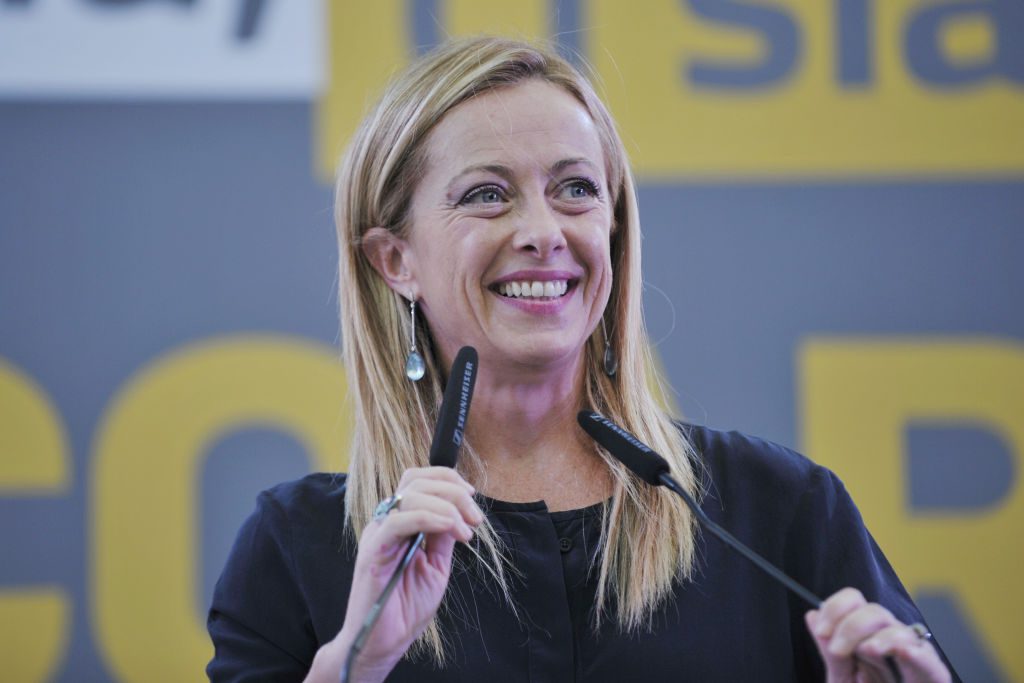Meet the Promising New Leader of the Italian Right

On May 31, the Italian right-wing party Fratelli d’Italia, led by Giorgia Meloni, for the first time reached 16 percent in the polls. This would have been an unimaginable result only a few years ago, and since then, Fratelli d’Italia has only continued to grow. The party recently reached 18 percent, surpassing the Five Star Movement and narrowing the distance between the Democratic Party and Lega led by Matteo Salvini.
The ascent of Fratelli d’Italia has been a slow one, only to sharply accelerate in recent months. That’s thanks to a unique figure in the Italian panorama: Giorgia Meloni.
As the only female leader on the Italian political scene, Meloni became an international star after a speech in Rome in which she stated: “I am Giorgia, I am a mother, I am Italian, I am Christian.” That was a good summary of the values of the Italian right wing: family, homeland, and Christianity.
She was later elected president of the ECR, the group of European conservatives, a move that represents the culmination of a path begun before last year’s European elections that saw her become one of the main political conservatives in Europe.
In Italy, her party now governs important cities in two regions, Abruzzo and Marche. She has managed to reconstruct the Italian right that had fragmented after the end of the Alleanza Nazionale party while at the same time bringing together numerous people from the Catholic and classical liberal worlds as well as Berlusconi’s party Forza Italia, which is nowadays in crisis.
The decision to join the ECR proved in hindsight to be a winning choice because, on the one hand, it avoided the problems suffered by the Identity and Democracy group, of which Marine Le Pen’s party is a member, and on the other, it avoided the cumbersome presence of Angela Merkel in the EPP group.
Today the ECR brings together more than 40 European and Western parties and is an authoritative presence in Europe. It counts as a member the PIS, the main governing party in Poland, and was itself inspired by the British Conservative Party before Brexit. The positioning of Fratelli d’Italia as a conservative party wasn’t just politics but the result of a metapolitical and cultural path that led to the support of values and battles dear to conservatism.
Giorgia Meloni’s participation in two important events in the United States, CPAC and the National Prayer Breakfast, aroused the interest of the international press. She later gave a speech at the national conservatism conference in Rome last February.
In her address, Meloni affirmed that “the great challenge of our time is the defense of national identities and the very existence of states as the only means of protecting the sovereignty and freedom of peoples.” In this sense, the enemy was the “globalist drift of those who consider identity, in all its forms, an evil to be fought and constantly act to shift real power from the people to supranational entities.”
The concepts of freedom, identity, and sovereignty recur in Meloni’s speeches. Fratelli d’Italia, meanwhile, fights “for a Europe of free and sovereign nations as an alternative to the bureaucratic superstate” formed after Maastricht. In this context, the “national conservatives” are the only ones who are defending the national state. Explaining this perspective, Meloni cites Roger Scruton and J.R.R. Tolkien as well as Pope John Paul II and Ronald Reagan.
Meloni’s election to president of the ECR is significant not only for her as a national leader but also an international one. Fratelli d’Italia understood the need to be accredited as a reliable interlocutor in Europe and in the conservative world to consolidate its internal growth.
It’s a line that, if maintained, will bear fruit in the medium to long term, in a historical moment in which sovereignty is under attack from many sides and sovereignists are often called extremists.
These days, conservatism represents the future, the middle ground between sovereignist and classical liberal thinking. Meloni intends to put the nation and the national interest first while also regarding the freedom of the individual as a primary value within the community.
As Roger Scruton explains, while conservatives have positions that distinguish them from liberals, they also shun extremism.
The conservative vision emphasizes the need to preserve not only the Italian identity but also the European one. The future of the right wing will combine form and substance, the need to sit at the tables that matter without abdicating values and ideals.
Expectations for Giorgia Meloni are high, to the point that the British newspaper The Times at the end of 2019 included her on its list of “twenty people who can change the world in 2020,” together with prominent international figures such as Jimmy Sham, one of the leaders of the Hong Kong protest movement, and Princess Leonor of Spain.
Meloni’s international recognition is just another step on the path for an up-and-coming leader. There are already those in Italy who see her as their next prime minister, though today she’s content to continue to work to build a large conservative right wing in Italy and Europe.
Francesco Giubilei is an entrepreneur, author, and independent journalist based in Rome, Italy. He is founder and president of the Nazione Futura magazine and foundation.
Comments